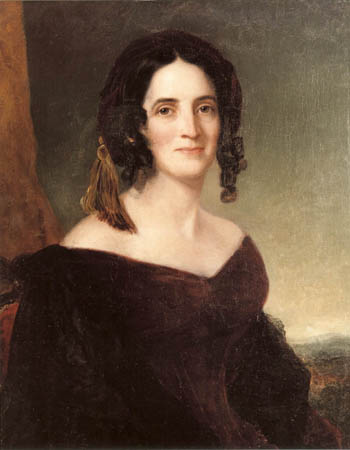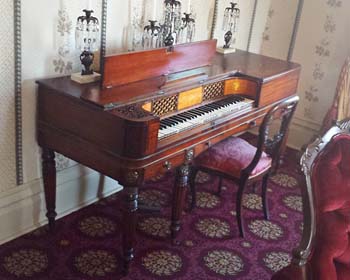
In the pioneer times of Middle Tennessee, nature filled the air with musical sounds in picturesque scenes over rolling countrysides, along with winds that whispered through thickly populated woods of oak, beech, cedar, hickory, walnut, wild cherry and willow. Resonating through branches bearing every shade of green were the stir of animal sounds, the hum of insects and the sweet notes of birds flitting to and fro, providing clear, sweet, natural notes leaping upward into the light against the beauty of a soft blue sky. Living in this surreal environment, a piece of America’s musical history emerged, thrived and evolved. The music of Middle Tennessee and Murfreesboro became like the hub of a gigantic wagon wheel radiating with a variety of styles and influences as it turned and traversed beyond our community and across the decades.
The people of Murfreesboro had sent the invitation to the Hermitage, and Andrew Jackson had accepted. The memory of the great victory at the Battle of New Orleans in 1814 was fresh. At dawn, the Murfreesboro Sentinels, the community military company, had fired their muskets as the band played. Again and again, they marched and paraded in order around the Courthouse until finally arriving at the splendidly decorated chamber reception hall inside. A patriotic song had been written for the occasion:
Old Hickory was there, the poet sung
The people of this pretty town,
Dispatched a deputation down . . .
For two long hours at the reception, many of the aging warriors—heroes from the Revolution filled with patriotic sentiments—raised their glasses to toast and salute their champion, Andrew Jackson. All present were regaled by the excellent music, including “Yankee Doodle” and “The Star Spangled Banner” and various lively marches that celebrated Jackson’s achievements. The festivities concluded with a ball, with many dancing reels resonating around the hall to “violins discoursing sweet string sounds giving life and spirit to all present.” The 12-hour, daylong social gathering finally ended with all in consensus, both young and old, who would support the idea of Jackson’s candidacy for President of the United States.
Up until the Civil War, Murfreesboro played an important role in the political climate of Tennessee. As the state capital was transferred from Knoxville to Murfreesboro between 1819 and 1826, many important meetings convened with identifiable names who would later gain prominence on the national scene: Davy Crockett, James K. Polk, Sam Houston and, of course, Andrew Jackson. At the time, the slogan was popularized, “As Goes Rutherford So Goes Tennessee.” With the influence that our community had on the political climate of the nation, it could also be said, “As Goes Rutherford/Murfreesboro So Goes the Nation.”
Rutherford County and Murfreesboro differed from the earlier pioneer settlements of Watauga and around Nashville at the Cumberland. These were considered primary settlements. By 1815 in Rutherford County, elegant brick houses and beautiful country homes were replacing log structures. Middle Tennessee had more than doubled in commerce and manufacture while Murfreesboro was becoming a formidable economic center dotted with cotton plantations. Many of the wealthier, more refined families, with recognizable names like Lytle, Ready, Childress, Rucker, Maney and Murfree, had large, spacious homes and many slaves. These families entertained in a typical Southern grace and style, hosting parties and dances filled with the sounds of popular music of the day.
Sarah Childress Polk was the third child of Joel and Elizabeth Childress, born when Rutherford County was formed in 1803. Joel Childress was one of those wealthy merchants and landowners who valued education, believing that his young girls would benefit from educational opportunities. When Sarah was 13 years old, she and her sister, Susanna, attended the Moravian Female Academy in North Carolina. In addition to her other studies, Sarah developed a love for music and compiled some of her favorite songs in a music book. In 1942, that music book was lifted from some rubbish and has become one of the few preserved artifacts to have survived this period, a visible record of the popular songs of the day. The songs, mostly sentimental and patriotic, are not characteristically American. In addition, the book contains chivalric love and courtship, pieces for musical theater and instrumental works for the piano. Her notations indicate that she obviously played these tunes as a musical pastime with her friends and family. The songs were very familiar and typical of a young woman of Sarah’s economic and social position. One of the two piano pieces in the songbook was meant to be played in the parlors by amateur musicians: “Lord McDonald’s Reel” and “General Jackson’s March.” The melody for “Lord McDonald’s Reel” became an old-time Southern fiddle tune.
In the fall of 1819, Sara and Susanna traveled 30 miles to Nashville to see the arrival of the first steamboat in Nashville, the General Jackson, named for the beloved Andrew Jackson. As the carriages gathered at the pier, the crowds cheered while a multitude of parasols swung wildly into the air. These young girls of means enjoyed a musical gala as the bands played at this affair.
The romance between James K. Polk and Sarah Childress blossomed in Murfreesboro. In those days, a young man would call on a young lady by himself or take a friend. Sarah was not only intelligent and charming but simply radiant, with long black ringlets that loosely framed her lovely face. James not only found Sarah fashionable but a fascinating conversationalist confidently discussing the common issues of the day. She easily discussed many subjects, including poetry and history. Sarah would sing and play from her songbook for many hours as they enjoyed each other’s company. Eventually, they married on Jan. 1, 1824, at the Childress home. Around Murfreesboro with celebrating bands, their nuptials were enjoyed with a round of house parities that lasted a week. However, Sarah’s strict Presbyterian religious beliefs would not allow dancing at these parties.
When James assumed the duties of Speaker of the U.S. House of Representatives in 1825, Sarah spent the next 14 years supporting her husband’s political career, even acting as his personal secretary and keeping him informed of events relating to the political agenda of the moment. Her reputation as a popular hostess, along with her polished insight, was soon to advance her husband’s political career entertaining politicians and Washington socialites.
In 1844, James K. Polk, graduate of Bradley Academy here in Murfreesboro, became the 11th president of the United States. Sarah was notable for changing the public image of the White House. While she continued her devotion to her religious convictions, Sarah banned all dancing and hard liquor in the White House, a complaint of many who could not dance in the newly decorated ballrooms. Even so, with her formidable management skills, she enjoyed considerable respect and popularity as a First Lady, defining that role for many First Ladies in the future.
At the end of Polk’s term, James and Sarah returned to Nashville to retire; however, Polk became ill with cholera-induced fever and died 53 days later. Devastated and grief-stricken, Sarah spent the remainder of her life preserving her husband’s legacy. For the most part, she became a recluse, only appearing to go to church or to visit her mother in Murfreesboro. She continued to wear full mourning clothes for 42 years until her own death in 1891.
One of the inclusions in Sarah’s songbook is “Hail to the Chief” by songwriter James Sanderson. For this addition to appear in her songbook years before as a young girl is surprisingly prescient. As First Lady, she is often credited for ritualizing its use for future Presidents’ arrival. It is now considered the Presidential Anthem of the United States. To this day, its playing accompanies and signals the entrance of the President.
What do you do when life throws you a curve, blind-siding you with an unexpected tragedy or event? Are you or someone you know going through a tough time—a death of a loved one, sudden loss of a job, or something that has happened that does not make sense? In your mind, audaciously, you are asking the sticky question, “Why, God why?”
Do trauma and tragedy somehow give you permission to choose what to think and what to do? You can choose to stay in the dark places in life wondering why, or move beyond the pain and confusion of your circumstances. Most of the times we do not get the answers we want, but we can press into God and trust Him even when we do not understand. Unlike Sarah Childress, don’t let the trauma of an event be a defining factor in you the rest of your life. You can choose to stay in the valley of the shadow of death or rise above to be strong and renewed. God is faithful no matter what! Allow this acquired truth and knowledge to become a reality. One moment at a time, that truth will become greater than the doubt and confusion surrounding you.
Link to the songs from Sarah Childress’s songbook:
Lively fiddle tune — Lord McDonald’s Reel:
The Presidential Anthem: Hail to the Chief















